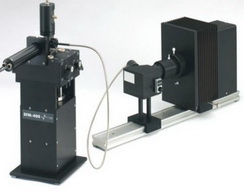|
The
SFM-3 was introduced in 1987. This was the first three syringe
stopped-flow system using independent stepping motor technology, Berger
Ball mixers and an electro-valve hard-stop.
In 1992 the four syringe
SFM-4 brought triple mixing capability to the rapid kinetics field,
increasing the range of applications available.
1999 was a milestone
year with the introduction of the two syringe SFM-20, the SFM-300 and
SFM-400. The SFM-300/400 reduced the size of instrument, dead volume,
sample consumption, and dead time by nearly a factor of two. The SFM-300
also brought dead time down to 200 µs based on published results,
making it the reference system for very rapid reactions.
2011 brings
the introduction of the third generation SFM-2000/3000/4000 systems.
With a common drive chassis, this generation offers simpler upgrades to
three or four syringes, smaller dead volume, and improved overall
performance.
Unique Features:
· Independent stepper motor control for each syringe
· Automatic concentration dependent studies
· Mixing ratio is fully programmable from Bio-Kine
· Ratios can be changed without syringe
· or hardware changes
· μl precision – No pressure artifacts
· Modularity from SFM-2000 to SFM-3000 and SFM-4000
· Quench-flow capabilities using optional quench valve
Specifications:
· Independent syringe control of volume
· Independent control of flow rate
· 200 µs dead time
· Mixing ratio 1:1 to 1:100
· Low dead volume 88 µl
· Sample economy
· Automated concentration dependent studies
· Automated concentration dependent studies
· Compatible with: MOS-LED, MOS-200/200M,MOS-450/AF-CD, MOS-500,MOS-DA, MCS-200
Many external devices with appropriate options
Applications:
· Biochemistry: protein folding/unfolding
· Water & ions transport in vesicles
· Organic & inorganic chemistry
· Enzyme kinetics: ligand binding conformational changes
· Micelles, second messenger, drug design, polymerization, and more.
|


